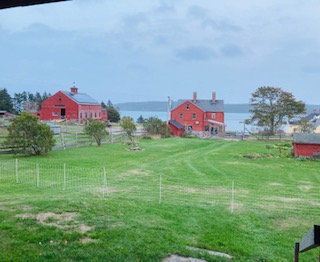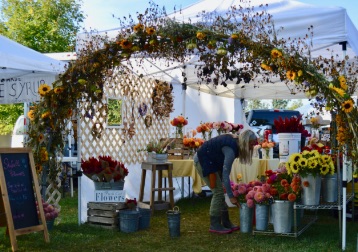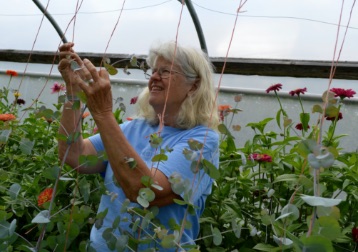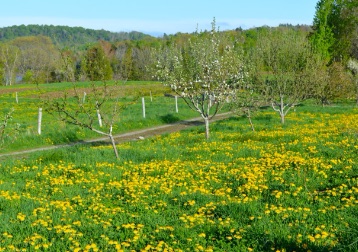Roque Island Homestead

April through October is ideal, but will consider alternatives. Minimum 8 weeks required. We do not have any paid year-round opportunities available.
Roque Farm is located on a private island off the coast of Downeast Maine in Washington County. The island is accessed by our fleet of boats, the average crossing time is 10-15 minutes. The mainland dock is 10 miles from the nearest town (Machias). The main island is 1600 acres, 50 of which are in pasture or hay fields. There are two large barns, several smaller outbuildings, 3 owner houses, and 3 staff houses, all located on the north side of the island. The rest of the island is wooded, with a few dirt roads, many hiking trails, and a mile-long sand beach. It’s a beautiful place to hike, swim, kayak, or bike.
We run a diverse working farm that has been in operation for 200 years, owned and managed by the same family for that time. Our mission is to provide quality food products in a humane and sustainable manner for island residents, which includes year-round caretaking staff (6 ) and visiting members ( up to 40 at a time during the summer). We do not sell to the general public but do make contributions to food banks when we have an excess. Year-round we keep a herd of sheep (meat and fiber crosses), dairy cows, horses, goats, and laying hens; seasonally we raise pigs, broiler chickens, and turkeys. We have a ¼ acre garden including 24 raised beds, a main garden, several herb and flower beds, and a small apple orchard; we freeze, can, dehydrate, and store produce. We make our own hay and rotationally graze the sheep, broilers, horses, and cows. Poultry is processed on island and pork, lamb, and beef are sent off-island for processing. We make butter, cheese, yogurt, and ice cream. We produce our own lumber and cut firewood. We use tractors and equipment for haying and moving manure and compost. We are currently transitioning to a no-till garden, have plans for a small high tunnel, and are venturing into bee-keeping.
We’re grateful for the ocean breezes and view, and the wilderness only a step away. The trade-off is that it is more challenging to obtain supplies (such as grain) or to receive veterinary care for our animals. Tides and wind conditions add to the challenges of strategizing.
We are not certified organic, but the garden is managed following organic standards and we have transitioned to no-till. The animal operations are primarily conventional (feed and veterinary care), but we strive to provide as natural and stress-free lifestyles as possible while the animals are in our care. We do not use pesticides or herbicides on the garden, pastures, or fields. We use a holistic and regenerative management filter when making decisions for what is best for the land, environment, and animals.
Apprentices will help with the daily care of all the animals on the farm and will help with planting, weeding, harvesting, and processing produce. Apprentices will have the opportunity to become skilled at milking cows, making butter, handling livestock and horses, rotational grazing practices, making hay, processing poultry, and working on fencing and small carpentry projects. They will have the opportunity to take responsibility for planting, maintaining, and harvesting areas of the garden.
We require a valid drivers’ license. We also require that an apprentice be able to perform physical labor 8 hours a day in all types of weather and be able to lift 50# on a regular basis. The ability to drive a standard would be a plus (but willing to teach).
Apprentices are expected to work 8 hours a day, with 2 breaks for breakfast and lunch. We have found that longer stretches work better for island scheduling, so rotations are usually 10 days on, 4 days off, allowing time for people to travel if they desire. Our workload varies, there will be times of heavy physical labor (haying) but most days there is quite a variety of tasks- some gardening, some animal care, some fencing. Most of the work is outside and requires physical labor of varying degrees. We would prefer someone who is capable of working independently some of the time and who may want to take on some special projects of their own interest that would be valuable to the operation.
Some non-farm assistance may be requested; this may involve filling in for the cook, running errands, and helping to clean the communal areas. We are a small team and everyone pitches in to some degree in all areas to help the whole operation run smoothly.
There are 6 full time island caretaking staff and they each have a variety of skills to share; all will provide some instruction in different areas. The island manager(myself) and assistant farm manager will provide most of the instruction via working together, instruction, independent projects, and recommended reading. Apprentices will be instructed and supervised until they demonstrate the skill level to work independently, and then apprentices will take on some responsibility for those areas. There will always be several people available to answer questions and/ or work alongside, to help develop and hone skills. We have informal farm meetings every morning to make a plan and update everyone, and the entire farm team helps in planning for the week and month. Feedback is given as needed and we try to stay attuned to how staff are doing within our tiny community, checking in regularly about how things are going.
I’m not a full time farmer, but am on-farm and on-call 24/7 as the Island Manager, managing the entire scope of the island operations. Managing the farm is a component of my principal occupation. We employ a year-round assistant farm manager who handles most of the day to day tasks, and I assist, advise, and mentor the farm team as needed.
I help with farm chores twice a day and manage the overall farm operations; depending on the plan for the day I may spend as few as 2 hours with apprentices or as many as 6 hours. Apprentices will be under the guidance of the assistant farm manager for most of the day and may work on independent tasks for some of the day. We also all join up for breakfast and lunch.. .many great questions and concerns come up over a good meal.
We provide a stipend of $80/ day to start. We will increase the stipend for apprentices who have some prior experience and skills to share, and show a high level of motivation. Room and board (2 meals) are provided in addition to the stipend, and apprentices can also use the farm products. The probationary period is 2 weeks.
Yes, On-farm
The apprentices (up to 3) will have a private wing of the Farmhouse, where they will each have a private bedroom and share a bathroom and living room. Four year-round staff members also live in the house in mini-apartments. The apprentices will also have access to the staff kitchen, dining room, and office that are shared by the entire staff. There are no children in residence. Apprentices share the responsibility of cleaning the apprentice wing and are expected to help with general upkeep of the other communal areas. There is no smoking in the Farmhouse. Moderate drinking is allowed if the apprentice is 21. Drugs are prohibited. These rules apply on days off as well, if the apprentice remains on-island.
We prefer a visit prior to commitment, but that is not always possible. The island is a unique place and it can be difficult to give people a sense of it without a first-hand experience. We have a two-week trial period, during that time we discuss questions, concerns, and issues and assess whether the original arrangement will work for both parties.
We have an employee handbook for all island staff, which the apprentice will receive. Evaluation and feedback will be given verbally on a daily basis, unless a formal evaluation is requested. If there is an issue, we will have a formal evaluation and discussions of how to move forward. In this unique island situation interpersonal dynamics are of great importance. If issues cannot be resolved, the arrangement will be terminated.
I’m an introvert with a deep love for the land and all animals. I enjoy sharing my knowledge and love for farming. I have 16 years experience in diverse farm animal management (livestock, poultry, dairy, horses), 7 years as owner/ operator of a MOFGA certified farm (produce), and 20 years organic gardening experience. I believe in sustainable, holistic, humane management of land and animals, and in providing a creative and productive space for plants, animals, and people to thrive. I have strong interests in rotational grazing, regenerative agriculture, and continuing to learn and build skills in all farming areas, as well as to educate others in my skill areas. In my free time I like to read, play with my dog, and ride horses.
We have a variety of ideological and political views among our staff, all are welcome. We are open to differing views and would hope that an apprentice would be open to differing views as well.
Roque Farm has hosted interns and WWOOFers for the past 13 years. We have hosted interns from all over the US, from a wide range of backgrounds and beliefs, and the common denominator for them all is a desire and passion for learning how to farm. We are committed to continuing the farm as a space that encourages learning and growth and provides new farmers with some basic but diverse skills. We choose staff who are also committed to learning and teaching. The farm is owned by the Roque Island Homestead Corporation and follows all applicable laws pertaining to legal employment. We are committed to providing safe and respectful working and living conditions and providing fair compensation. Over the last 10 years we have had several interns return to join the staff or stay for a longer time than the original commitment.
As a farm operation on an island, sustainability is always in the forefront of our planning and decision-making. We aim to be regenerative, sustainable, and productive in order for the farm to thrive well into the future. The island has hosted numerous environmental studies to inform us for the future and support those in the environmental field (birds, bees, intertidal zones, plants, land management, mycorrhizal).
Colin Freeman (Former apprentice)
[email protected]
Emma Jensen (Former apprentice)
[email protected]
Sonya Carver (Personal reference: Friend and co-worker)
[email protected]



Roque Island Homestead
- Physical Address
-
243 Schoppee Point Rd
Roque Bluffs, ME 04654
- Website
- Phone

